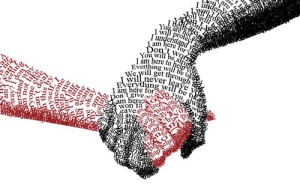The Power of Words: Being Mindful About Adoption
 Words: simple combinations of consonants and vowels. When alone or strung together, they carry particular meanings, feelings, and knowledge. When spoken, words communicate additional implications because of tone, body and facial language, and context. I don’t believe you have to hold a degree in English literature or Linguistics to know and understand the significance of words. Everyone communicates everyday by using words, spoken or signed, and experiences the emotions and reactions that get stirred up by them.
Words: simple combinations of consonants and vowels. When alone or strung together, they carry particular meanings, feelings, and knowledge. When spoken, words communicate additional implications because of tone, body and facial language, and context. I don’t believe you have to hold a degree in English literature or Linguistics to know and understand the significance of words. Everyone communicates everyday by using words, spoken or signed, and experiences the emotions and reactions that get stirred up by them.
In social media and other literature there have been several pieces written about what is more appropriate to say to an adoptive parent, an adopted person, and a birth parent. Wonder why that is? In the world of adoption, words are vital. The use and meaning behind adoption-related words can generate such strong and raw emotions and reactions. This is because in many cases, adoption words connect directly to identity, grief and loss, and connectedness amongst the adoption triad.
For example, in a previous blog post by Maya Rogers-Bursen, she addressed the use of “real parents” in relation to the adoptee. This idea of real can feel very shaming and hurtful for all three aspects. For the adoptee, this may serve as a reminder that his biological parents were unable to care and raise him, thus being sent away to live with strangers. For the adoptive parents, it may prompt memories of infertility or that their love for their adopted child can be disregarded by others because of that loss of genetic connection. And for the birth parents it may generate feelings of inadequacies because they may not have been able to raise their child at the time of his birth.
Without realizing it, words carry heavy weights that have the capacity to knock someone down. But words also have the ability to build strength within someone and lift them up. This post is about bringing awareness about the importance of words and wording within the adoption community. This isn’t about showing people who or what’s right, but about informing all people about the sensitivities that must be given when interacting with all members of the adoption triad. Adoption is more complicated than people may know or expect, therefore, learning to be more mindful of the language used may help diminish the negative feelings and outlooks that adoptees, adoptive parents, and birth parents may experience.
Written by Stephanie Chin, Clinical Intern
Boston Post Adoption Resources